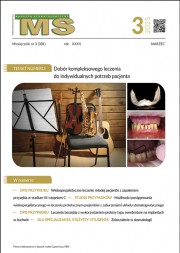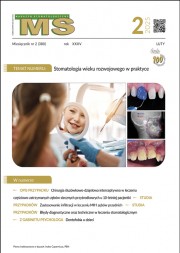Dostęp do tego artykułu jest płatny.
Zapraszamy do zakupu!
Po dokonaniu zakupu artykuł w postaci pliku PDF prześlemy bezpośrednio pod twój adres e-mail.
Marcin Tutak, Marcin Jędrzejewski, Marta Kłonica, Tomasz Smektała, Katarzyna Sporniak‑Tutak
PIŚMIENNICTWO
1. Gaviria L. i wsp.: Current trends in dental implants. J. Korean Assoc. Oral Maxillofac. Surg., 2014, 40, 50-60.
2. Cardoso M.V. i wsp.: Bone tissue response to implant surfaces functionalized with phosphate-containing polymers. Clin. Oral Implants Res., 2014, 25, 91-100.
3. Kasemo B.: Biological surface science. Surface Science, 2002, 500, 656-677.
4. Hench L.L.: Bioceramics: from concept to clinic. J. Am. Ceram. Soc., 1991, 74, 1487-1510.
5. Williams J.M. i wsp.: Bone tissue engineering using polycaprolactone scaffolds fabricated via selective laser sintering. Biomaterials, 2005, 26, 4817-4827.
6. Moin D.A. i wsp.: Designing a novel dental root analogue implant using cone beam computed tomography and CAD/CAM technology. Clin Oral Implants Res. 2013;24 Suppl A 100:25-27.
7. Mangano F. i wsp.: Custom-made, selective laser sintering (SLS) blade implants as a non-conventional solution for the prosthetic rehabilitation of extremely atrophied posterior mandible. Lasers Med. Sci., 2013, 28, 1241-1247.
8. Oshima M., Tsuji T.: Functional tooth regenerative therapy: tooth tissue regeneration and whole-tooth replacement. Odontology, 2014, 102, 123-136.














